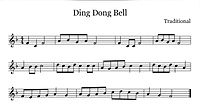- Ding Dong Bell
-
For the baseball pitchers, see Bill Bell (baseball) and Gary Bell.
"Ding Dong Bell"
Roud #12853
Written by Traditional Published 1580 Written England Language English Form Nursery rhyme "Ding Dong Bell" or "Ding Dong Dell" is a popular English language nursery rhyme. It has a Roud Folk Song Index number of 12853.
Contents
Lyrics
The most common modern version is:
- Ding, dong, bell,
- Pussy’s in the well.
- Who put her in?
- Little Johnny Green.
- Who pulled her out?
- Little Tommy Stout.
- What a naughty boy was that,
- To try to drown poor pussy cat,
- Who ne’er did him any harm,
- But killed all the mice in the farmer's barn.[1]
Origins
The earliest recorded reference to the rhyme is from John Lant, the organist of Winchester Cathedral in 1580, who recorded the following rhyme:
Jacke boy, ho boy newes,
- the cat is in the well,
let us ring now for her Knell,
- ding dong ding dong Bell.[1]
The phrase 'Ding, dong, bell' also appears several times in plays by Shakespeare. However, given the original of Shakespeare plays were in Quarto text and the majority were not published until 1623 in the First Folio (seven years after his death), the following phrase could actually be the writer's original instructions for sound effects, although this is not certain. The relevant passages are:
The Tempest, Act I, Scene II:
- "Sea nymphs hourly ring his knell:
- Hark! Now I hear them - Ding, dong, bell."
The Merchant of Venice, Act III, Scene II:
- "Let us all ring fancy's knell;
- I'll begin it - Ding, dong, bell."
The earliest version that resembles the modern one, with the additional lines that include (arguably) the more acceptable ending for children with the survival of the cat, is from Mother Goose's Melody published in London around 1765.[1]
Several names are used for the malevolent Johnny Green, including Tommy O' Linne (1797) and Tommy Quin (c. 1840).[1] Iona and Peter Opie suggested that it may have had its origins in Tom a lin or Tom o' Lin, the protagonist of another nursery rhyme.[1]
Reformed versions
The most common modern version is arguably already a moderation of the theme of the original rhyme. The fear that children might be affected by the violence of the rhyme and specifically that children might be tempted to put cats in wells, led to several attempts to reform the rhyme.[1] In his New Rhymes for Old (1949) Geoffrey Hall published the following alternative:
- Ding dong bell,
- Pussy's at the well.
- Who took her there?
- Little Johnny Hare.
- Who'll bring her in?
- Little Tommy Thin.
- What a jolly boy was that
- To get some milk for pussy cat,
- Who ne'er did any harm,
- But played with the mice in his father's barn.[1]
Notes
Categories:- Nursery rhymes
Wikimedia Foundation. 2010.
